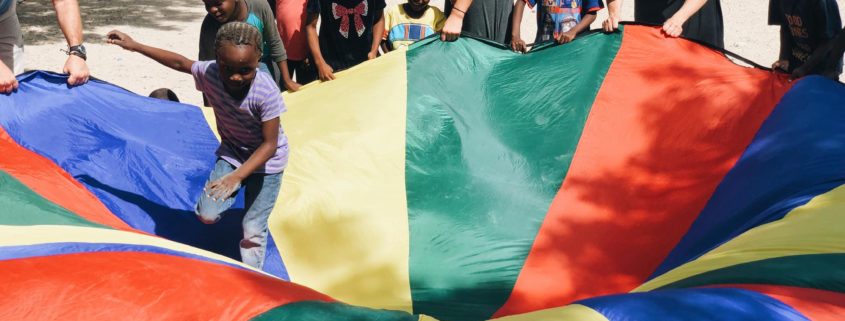Why Sabbaticals Matter at Mission Partners
By Hannah Lee
“It’s not the answer that enlightens, but the question” –Eugene Ionesco
As a communications professional, an important part of my job entails developing and delivering clear messages—researching, structuring arguments, writing concisely. Like many of my peers, I am laser focused on execution and solutions, and I often forget (or don’t find I have the time) to step back and critically think about the questions I am asking, or the answers I’m being given.
But earlier this summer, I was given a special opportunity to do just that.
In July, I had the privilege to truly step back—to take a sabbatical. At Mission Partners, we believe in the value of giving back to local communities through volunteerism, and we realize the impact of volunteerism on our day to day work. After the one-year mark with Mission Partners, each full-time employee earns sabbatical days—a unique and special model for a small firm like ours. In my case, I had the privilege of spending my sabbatical in Bercy, Haiti. Located 40 minutes outside of the Haitian capital, Port-Au-Price, Bercy is where Mission of Hope operates.
Mission of Hope brings life transformation for every man, women, and child in Haiti—including those who volunteer. The organization takes a comprehensive approach to building and strengthening communities by creating jobs, providing food and clean water, educating kids and adults, teaching agricultural skills, and caring for the sick and elderly. While volunteering, the phrase “we believe Haitians will rebuild Haiti” was constantly said throughout every activity, empowering Haitians to the leaders of their own success.
Through this experience, I learned much more than I will ever be able to give. Most importantly, my sabbatical reinvigorated my joy in asking questions, and listening intently to the answers.
On the first day, right after arriving at the airport, I was greeted by a Haitian staff member at the organization. He asked me what team I was rooting for in the World Cup. Before I could even answer, he stated that it better be Brazil. Immediately, I felt connected to him. In that conversation, I had learned my first lesson.
With a simple, intentional question, you can relate to anyone—even those who appear most different.
In that conversation, I was reminded that thoughtful questions can lead to connection. That was a powerful moment to start my sabbatical. Each day during the week, our group of 40 volunteers traveled to a partner village to collect survey data. The data collected was used to better serve families in the community. This information is vital to meet critical needs in the community like clean drinking water, health care services, food, and shelter. Each day we were assigned up to six homes, some made of brick and some still composed of blue tarp—a reminder that Haitian communities are still feeling the effects of the 2011 earthquake. At each home, we built new connections. We made new friends. We washed and then dried clothes on cacti while others played tag with kids. By the end of the week, survey data collection was our favorite thing to do.
But, it didn’t come easy.
To collect the data the organization needed, we received a list of survey questions. Right away, at our first house visit, we started asking “do you have access to clean drinking water?” and “when’s the last time you visited the dentist?” without even getting to know the people in front of us. We just dove into these personal and somewhat intrusive questions without thinking to step back. Without thinking to first build a connection with the single mom of two kids. My group fumbled through those thirty minutes, relying only on the awkwardly worded survey questions. Walking away, I felt disappointed. At the next house, we ditched the formulated questions and asked simple, intentional questions.
That changed everything.
Suddenly, the formatted questions were coming up naturally. Our conversations were full of mutual laughter, joy, and prayers for one another. I often pride myself on asking good questions, however in an unfamiliar place, I learned I have room to grow. And that was my second lesson of the week.
Asking intentional questions takes practice.
After a week of practicing asking intentional questions, it was time to head home to the U.S. Although I was sad to leave such an incredible place, I was ready to return home. As we were boarding the bus to the airport at 4:30 am, our flight was canceled. But not just our flight. For the next 72 hours, all flights in and out of Haiti were canceled due to political protests.
The Haitian government had raised fuel prices by 51%, making it nearly impossible for many Haitians to continue traveling to work, school, church, or really anywhere. In response, Haitians created blockades along the road in protest. As they awaited a response from the Haitian government, they continued to protest.
And we waited.
As Americans, we are used to quick answers, but in this situation, we couldn’t find the answer on our phones. And no question we asked could have given us a solid answer. We were safe, but as we waited, we grew anxious, tired, and confused. When would we go home? Would we have enough food? Would we be able to leave before the impending tropical storm hits? All good questions, but when volunteers asked, they knew there was a slim chance of having an answer. Which led me to my next lesson…
In times of uncertainty, too many questions may not always be the answer. Sometimes all you can be is present.
Returning home, I didn’t immediately take the time to process the last part of the trip. I felt overwhelmed and flustered. Even as friends asked, “how was your trip to Haiti?”, I went blank.
And then someone asked, “tell me about someone who inspired you” and I found words again. By drawing on a specific moment where I was present in relationship with someone, I could bring to life my experience instead swirling in the final 72 hours of uncertainty. And there was my final, and perhaps most important lesson.
It’s the thoughtful questions, not always the perfect answers, that enlighten.
This sabbatical pushed me to be a better version of myself, to come back to work with a new energy, and most importantly, to step back, reflect, and ask better questions. It’s just the answer I had needed.





 Check out our new
Check out our new